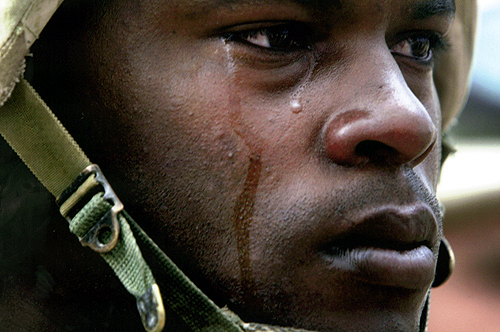
 Any kind of farewell is going to sound at least a little bit cliché. So I’m going to apologize in advance and do my best to reinvent all the regular sentiments that are so overused, yet so true. Because frankly, as hot as this summer has been and as nice as it will be to get a break from commuting on the DC metro, I’m really going to miss working at Becky’s Fund, and won’t forget all of the really valuable things I’ve learned while I’ve had the privilege to work here.
Any kind of farewell is going to sound at least a little bit cliché. So I’m going to apologize in advance and do my best to reinvent all the regular sentiments that are so overused, yet so true. Because frankly, as hot as this summer has been and as nice as it will be to get a break from commuting on the DC metro, I’m really going to miss working at Becky’s Fund, and won’t forget all of the really valuable things I’ve learned while I’ve had the privilege to work here.
So I’ll condense it down into my top 10 lessons from Becky’s Fund summer 2012:
1. Carrots are a noisy food. I learned this the hard way. If you don’t want to feel uncomfortable boss and/or coworkers, pick a less crunchy food for your lunches the first week.
2. Sustainability can be stressful, but always a worthy endeavor. One of the first and somewhat shocking lessons I learned coming into a non-profit for the first time was just how grant and donor dependent our mission is. If there are no funds to make the programs happen, they can’t. And if the programs don’t happen, we can’t make the difference we want to make. So grant writing, sponsorships and fundraising are key. In order to be a successful grant writer or fundraiser, you have to make someone else believe in the importance and effectiveness of what you’re doing as much as you do. I’ve never been more challenged to communicate “why” in so few words as when petitioning for funding, but in the end, it makes sense. If you can explain it clearly, others can understand it clearly and get on board with you to make the change you want to see in the world. The challenges of sustainability end up gifts in their own way.
3. When you hear no, you shrug it off and find a different way (otherwise known as “if at first you don’t succeed, try, try again”). When a company declines a sponsorship, or you don’t get the grant you were hoping for, you find a new way. Go out searching. Where there’s a will, there’s a way—maybe just not in the first place you thought it would be.
4. Organization will make you or break you. As a casual Excel spreadsheet user and color-coder before I came to Becky’s Fund, I thought I had the whole “get your ducks” in order thing down pat. In a non-profit, there are multiple programs, finances, sponsorships, meetings, grant deadlines and about a thousand other things. Google Drive is your friend. Spreadsheets, your love. Post its and to-do lists, your savior.
5. Believe in what you are doing, and you won’t want to stop. This applies really no matter the cause. Domestic violence and sexual assault as part of the larger sphere of gender violence and social inequality are so important to me, so working at Becky’s Fund has been a really productive outlet. One of the hardest things to do is accept that there are limitations. You can’t solve the issue you care about in one day. Working at Becky’s Fund has helped teach me that you can have your big dreams, but take it one day at a time. Keep going, and we’ll get there.
6. Clean your coffee mug regularly. Or risk the buildup of strange coffee colored residue and less tasty coffee.
7. Don’t panic when the train is late. Because you can’t make it go any faster. You’ll only get yourself worked up. Let someone know you’re delayed and just try to roll with it. And no matter how fast you run down the metro platform, even if you make the train, you still kind of look crazy.
8. Sooner is always better than later. It’s easy to forget about a task or assignment that comes through email if you don’t make a note or get on top of it right away. So just for safety’s sake, I’ll say do both. The more on top of it you are, the more relaxed you’ll feel.
9. C is for Communicate. If you don’t understand an assignment, ask for clarification. When you finish something, let the person who needs to know, know. There are a lot of circumstances where fewer words are better, but if it means getting the job done, more are always better.
10. Have fun. Not only did I love the cause we’re working for, but I loved the “we” who were working for it this summer. Go out to lunch. Ask people about their weekends. Share stupid videos you find on the internet. The people you work with give you the energy to keep going even when you might not want to stay hopeful. Reading about domestic violence incidents and statistics as part of the everyday can get you down, but it’s the good times and the good friends you have around you in the office who will give you the strength you need to keep caring, and keep fighting.
So goodbye to Becky’s Fund, for now. It’s been a blast. I can’t wait to see where the organization goes and all it’s going to be able to accomplish. Cheers to keeping up the good fight one day at a time and encouraging me to do the same. So with admiration, empathy and a lot of love, I’ll say good luck, and see you soon.

 PTSD is a topic that affects many, but is openly discussed by few. Soldiers who seek treatment for PTSD face many obstacles, from month long waiting lists to
PTSD is a topic that affects many, but is openly discussed by few. Soldiers who seek treatment for PTSD face many obstacles, from month long waiting lists to




Recent Comments